

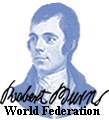
 |
 |
 |
"Arcadia
and the Real World"
(Robert Burns and the Classical Tradition………an
Immortal Memory)
"One of the most extraordinary men I ever met with" - this was how Robert Burns was described by the Principal of Edinburgh University - "his poetry surprised me very much, his prose surprised me still more, and his conversation surprised me more than both his poetry and his prose."
The Bard combined a practical nature with a vision to inspire us; as he wrote after destroying the home of a fieldmouse: "An forward, tho I canna see, I guess an fear!" His advice was sensible: "Catch the moments as they fly, And use them as ye ought, man!" In one of his letters, he set down these opinions: "Whatever mitigates the woes, or increases the happiness of others, this is my criterion of goodness; and whatever injures society at large, or an individual in it, this is my measure of iniquity."
 Burns
was an avid reader, - when young, he borrowed from teachers; in later years,
from the libraries of gentry friends; and, still later in Dumfriesshire, he
organised a circulating library for tenants and farmers. According to David
Sillar, "Some book or other he always carried, and read when not otherwise
employed". His knowledge went right back to the works of ancient poets.
Burns was not "familiar with Latin and Greek", but he had read Homer's
"Iliad", translated by one of his favourite authors, Pope; also
Virgil, in Dryden's translation, the epigrams of the Roman satirist Martial,
which he knew well enough to condemn a new translation of his time, and the
odes of Horace. These are only a few of the oldest authors from an astonishingly
varied and wide acquaintance with literature, from Addison and the Bible to
Shakespeare and the sentimental Shenstone. Burns felt no conflict between
a humble, even poor, home, and a love of learning.
Burns
was an avid reader, - when young, he borrowed from teachers; in later years,
from the libraries of gentry friends; and, still later in Dumfriesshire, he
organised a circulating library for tenants and farmers. According to David
Sillar, "Some book or other he always carried, and read when not otherwise
employed". His knowledge went right back to the works of ancient poets.
Burns was not "familiar with Latin and Greek", but he had read Homer's
"Iliad", translated by one of his favourite authors, Pope; also
Virgil, in Dryden's translation, the epigrams of the Roman satirist Martial,
which he knew well enough to condemn a new translation of his time, and the
odes of Horace. These are only a few of the oldest authors from an astonishingly
varied and wide acquaintance with literature, from Addison and the Bible to
Shakespeare and the sentimental Shenstone. Burns felt no conflict between
a humble, even poor, home, and a love of learning.
 Two
poets were named by him in the preface to his Kilmarnock Edition; the first,
Theocritus, was a Greek pastoral poet - imagine your local park without the
visitors but with shepherds singing about love, and challenging each other
to piping contests - pan pipes, not bagpipes - mustn't frighten the sheep!
The Sicilian shepherds of Theocritus were real people, and didn't speak 'proper'
Greek, but their local Doric dialect was fresher and more vigorous. For Burns,
only one could match Theocritus
- the Scottish poet Allan Ramsay, who "paints auld Nature to the nines",
in his "sweet Caledonian lines". Ramsay and Burns also preferred
their own familiar tongue, the Doric of Scotland.
Two
poets were named by him in the preface to his Kilmarnock Edition; the first,
Theocritus, was a Greek pastoral poet - imagine your local park without the
visitors but with shepherds singing about love, and challenging each other
to piping contests - pan pipes, not bagpipes - mustn't frighten the sheep!
The Sicilian shepherds of Theocritus were real people, and didn't speak 'proper'
Greek, but their local Doric dialect was fresher and more vigorous. For Burns,
only one could match Theocritus
- the Scottish poet Allan Ramsay, who "paints auld Nature to the nines",
in his "sweet Caledonian lines". Ramsay and Burns also preferred
their own familiar tongue, the Doric of Scotland.
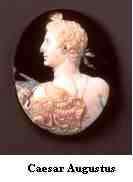 There
was an Augustan style popular
in his day, which Burns adopted when it suited him. It was so called after
poets like Virgil, Poet Laureate of the Emperor Caesar Augustus, the other
poet mentioned in the preface - they had invented an imaginative idyllic semi-mythical
world of brightness and happiness, called Arcadia. You've seen it in paintings
- sketches depicting peasants beside a ruined fountain; pictures such as "The
Young Shepherd" and "The Young Shepherdess" in Brodie Castle,
where Burns stayed overnight in 1787;
subjects familiar to the Bard from visiting the homes of the gentry.
There
was an Augustan style popular
in his day, which Burns adopted when it suited him. It was so called after
poets like Virgil, Poet Laureate of the Emperor Caesar Augustus, the other
poet mentioned in the preface - they had invented an imaginative idyllic semi-mythical
world of brightness and happiness, called Arcadia. You've seen it in paintings
- sketches depicting peasants beside a ruined fountain; pictures such as "The
Young Shepherd" and "The Young Shepherdess" in Brodie Castle,
where Burns stayed overnight in 1787;
subjects familiar to the Bard from visiting the homes of the gentry.
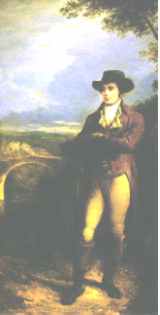 In
the Nasmyth portrait of Burns, he poses as the pastoral poet in a pastoral
setting. Burns knew he need not "hunt as far as Rome or Greece, To gather
matter for a serious piece", but he used the Augustan style at times
so that the noblesse and literati of the capital would take him seriously
- being Scottish admirers of Voltaire and Rousseau, they sincerely - and mistakenly
- believed that Scottish writers needed to adopt this style to be able to
hold their own in the fast-developing Europe. The phrases of Burns' "Address
to Edinburgh" match the classical crescents and noble squares of the
New Town: "Here Wealth still swells the golden tide. As busy Trade his
labour plies; There Architecture's noble pride, Bids elegance and splendour
rise." This style came in handy when he was in personal despair - "Oppress'd
with grief, oppress'd with care, A burden more than I can bear, I set me down
and sigh." Thank heavens that in most of his work Burns used the vibrant
and vigorous language of the native Scots tradition.
In
the Nasmyth portrait of Burns, he poses as the pastoral poet in a pastoral
setting. Burns knew he need not "hunt as far as Rome or Greece, To gather
matter for a serious piece", but he used the Augustan style at times
so that the noblesse and literati of the capital would take him seriously
- being Scottish admirers of Voltaire and Rousseau, they sincerely - and mistakenly
- believed that Scottish writers needed to adopt this style to be able to
hold their own in the fast-developing Europe. The phrases of Burns' "Address
to Edinburgh" match the classical crescents and noble squares of the
New Town: "Here Wealth still swells the golden tide. As busy Trade his
labour plies; There Architecture's noble pride, Bids elegance and splendour
rise." This style came in handy when he was in personal despair - "Oppress'd
with grief, oppress'd with care, A burden more than I can bear, I set me down
and sigh." Thank heavens that in most of his work Burns used the vibrant
and vigorous language of the native Scots tradition.
 Burns kept
coming back to his own land and his own vernacular language - if he had escaped
into Arcadia, our founders would never have begun these Annual Celebrations.
Allan Ramsay boasted, "The Rivers flow from our own Fountains".
Burns promised, "We'll gar our streams an burnies shine, Up wi' the best."
- and he did - "thy crystal stream, Afton, how lovely it glides".
David Sillar gallantly described the nymphs on Scottish mountains as being
just as charming as those in Arcadian hills.
Burns kept
coming back to his own land and his own vernacular language - if he had escaped
into Arcadia, our founders would never have begun these Annual Celebrations.
Allan Ramsay boasted, "The Rivers flow from our own Fountains".
Burns promised, "We'll gar our streams an burnies shine, Up wi' the best."
- and he did - "thy crystal stream, Afton, how lovely it glides".
David Sillar gallantly described the nymphs on Scottish mountains as being
just as charming as those in Arcadian hills.
The classical reference did have its place as a handy poetic device. Alison Begbie sparkled all day long with "twa roguish een" from "When rising Phoebus first is seen," until "ev'ning Phoebus shines serene". When the poet's horse, named Pegasus, needed the attentions of a blacksmith, Burns penned a poem to the local Vulcan. References to mountains such as Helicon and Parnassus were all part of the verbal luggage of a poet of his time; but even here we have the realistic touch, when Burns described himself as "a Bard who detested all sadness and spleen, And wish'd that Parnassus a vineyard had been."
 The
pseudonyms used for certain lady friends were also part of the Arcadian conceit.
In 1787-88, the poet, the toast of the capital, and the infatuated Mrs Nancy
McLehose addressed themselves as Sylvander and Clarinda: it was her idea -
and he approved, saying "I like the idea of Arcadian names in a commerce
of this kind." In a poem of Theocritus, the nymph at first coyly refuses,
but eventually yields under the whispering cypresses; one wonders whether
Nancy finally yielded to her rustic Adonis behind the whispering curtains
of the capital. His pen-name Sylvander is very artificial, a half-Latin, half-Greek
hybrid - invented for the hero of an earlier romantic novel. Clarinda had
been a popular name with romantic poets for two centuries. Only one of Sylvander's
nine songs for Clarinda has really stood the test of sincerity and popularity
- his haunting farewell "Ae Fond Kiss" - but their relationship
was worth it for that one song - "Never met or never parted, we had ne'er
been broken-hearted".
The
pseudonyms used for certain lady friends were also part of the Arcadian conceit.
In 1787-88, the poet, the toast of the capital, and the infatuated Mrs Nancy
McLehose addressed themselves as Sylvander and Clarinda: it was her idea -
and he approved, saying "I like the idea of Arcadian names in a commerce
of this kind." In a poem of Theocritus, the nymph at first coyly refuses,
but eventually yields under the whispering cypresses; one wonders whether
Nancy finally yielded to her rustic Adonis behind the whispering curtains
of the capital. His pen-name Sylvander is very artificial, a half-Latin, half-Greek
hybrid - invented for the hero of an earlier romantic novel. Clarinda had
been a popular name with romantic poets for two centuries. Only one of Sylvander's
nine songs for Clarinda has really stood the test of sincerity and popularity
- his haunting farewell "Ae Fond Kiss" - but their relationship
was worth it for that one song - "Never met or never parted, we had ne'er
been broken-hearted".
Another lady, his affair of summer and autumn 1794, was Jean Lorimer - for her, Burns chose the pseduonym "Chloris" from a stage comedy of 1668; it's actually a genuine classical name, a daughter of Niobe. Burns must have known, and ignored, the name's use in the poems of Horace for a prostitute in Rome; and presumably he did not know that Chloris had been used by another 17th century playwright for a shepherdess who achieved orgasm by wallowing in the filth of a pigsty!
 A
poet's Muse in those days also had to have an appropriate classical persona,
a poetic self-indulgence. The name Scota had been used a few years earlier
by someone else. The lad "born in Kyle" chose the name Coila. The
name appears first in "The Vision", and a stanza added in a later
edition refers to Coilsfield, where Highland Mary seems to have been a dairymaid.
It has been argued that the personality behind the name Coila, the inspiration
for his work, could be "Highland Mary" herself.
A
poet's Muse in those days also had to have an appropriate classical persona,
a poetic self-indulgence. The name Scota had been used a few years earlier
by someone else. The lad "born in Kyle" chose the name Coila. The
name appears first in "The Vision", and a stanza added in a later
edition refers to Coilsfield, where Highland Mary seems to have been a dairymaid.
It has been argued that the personality behind the name Coila, the inspiration
for his work, could be "Highland Mary" herself.
We can muse over what the Bard's thoughts would have been on the new statue in Kilmarnock (erected in 1996) - himself and Kilmarnock printer John Wilson, with Apollo, patron of poets, on one side, and Hermes, patron of printers, on the other. His Kilmarnock preface claims he is not imitating the tradition of Theocritus and Virgil, but Sandy Stoddart's classically-inspired Kilmarnock statue subtly acknowledges Burns' place, and our place, in the long history of Western civilisation, reflecting the tremendous breadth of knowledge that the poet carried so easily, not obvious in his best work, but nevertheless contributing to it. When it comes to his preparation of 350 of the songs of Scotland, we should note that he familiarised himself with all that had previously been published on the subject - Burns became the greatest expert of them all. "Ca the Yowes to the Knowes", in which Burns preserved and mended a traditional ballad, brings together the traditional idea of shepherds and shepherdesses in love with the realities of Scottish country life. Burns knew he was keeping Scotland's songs alive - he was even prepared to do the work for free. That he knew early on that he was preserving as well as creating, is shown by the Kilmarnock edition sub-title "Poems chiefly in the Scottish dialect", and the provision of a glossary, not just for the gentry to consult.
 Arcadia
was too unreal to divert for long the attentions of one known to his friends
as Rab Mossgiel. Not just a ploughman or a hired hand on some other man's
estate - Burns was a tenant farmer. He prized his independence. He prized
his father's "dauntless heart that fears no human pride"; he showed
his self-confidence in "I can haud up my heid wi the best o the breed".
He described himself as one who, "dear as he prizes Poetic Fame, yet
holds dearer an Independent Mind." And of course there is that stirring
phrase in "An Epistle to a Young Friend" - "the glorious privilege
of being independent". Like many a Scot, that independence had to be
financial also; when he could have done with a loan to finance a second Kilmarnock
edition, he refused one from John Ballantine, a friendly banker in Ayr, though
he did take his advice to seek a publisher in Edinburgh.
Arcadia
was too unreal to divert for long the attentions of one known to his friends
as Rab Mossgiel. Not just a ploughman or a hired hand on some other man's
estate - Burns was a tenant farmer. He prized his independence. He prized
his father's "dauntless heart that fears no human pride"; he showed
his self-confidence in "I can haud up my heid wi the best o the breed".
He described himself as one who, "dear as he prizes Poetic Fame, yet
holds dearer an Independent Mind." And of course there is that stirring
phrase in "An Epistle to a Young Friend" - "the glorious privilege
of being independent". Like many a Scot, that independence had to be
financial also; when he could have done with a loan to finance a second Kilmarnock
edition, he refused one from John Ballantine, a friendly banker in Ayr, though
he did take his advice to seek a publisher in Edinburgh.
The strength of his opinions often inspired attacks on such as the unco guid - "O ye, wha are sae guid yoursel, Sae pious or sae holy", characters like "Holy Willie", the reverend gentlemen at "The Holy Fair, the book-learnt college students who "gang in stirks, and come out asses." But the poet has many voices, and we have always to check for whom a poem, song or letter was written before we can confidently decide whether we are hearing the poet's true voice - and often it is not. Although, when seeking patronage in 1786, he wrote: "Learning never elevated my ideas above the peasant's shed", in reality, the very complexity of his cultural awareness makes it necessary to read between the lines. The last line of Burns' epitaph to his father "For even his failings leaned to virtue's side" is not another example of how Burns could express great thoughts in simple phrases, but a line, openly quoted, from Oliver Goldsmith's "The Deserted Village".
 Sir
Walter Scott commented on his air of "dignified plainness and simplicity".
Professor Dugald Stewart, to whom Burns was introduced by Dr John Mackenzie,
wrote that Burns' only affectation, if he had any, was "his habit of
peppering his conversation with French words and phrases" - he had been
reading French prose in the original at the age of 14. But we sense that friendship
wins over the temptation to strike a pose - in the letters to David Sillar
in the Irvine Burns Club Museum, he humorously ticks off his old friend for
addressing him as "Mr Burns" as if he were a ship's master reporting
to his boss the safe transport of barrels of herring, and tells Davie to address
him as Robin, as an old acquaintance should. His friendship was genuine. His
version of the traditional ballad "Auld Lang Syne" has become international,
reflecting all the mutual loyalty, all the comradeship between individuals,
that has existed since the world began.
Sir
Walter Scott commented on his air of "dignified plainness and simplicity".
Professor Dugald Stewart, to whom Burns was introduced by Dr John Mackenzie,
wrote that Burns' only affectation, if he had any, was "his habit of
peppering his conversation with French words and phrases" - he had been
reading French prose in the original at the age of 14. But we sense that friendship
wins over the temptation to strike a pose - in the letters to David Sillar
in the Irvine Burns Club Museum, he humorously ticks off his old friend for
addressing him as "Mr Burns" as if he were a ship's master reporting
to his boss the safe transport of barrels of herring, and tells Davie to address
him as Robin, as an old acquaintance should. His friendship was genuine. His
version of the traditional ballad "Auld Lang Syne" has become international,
reflecting all the mutual loyalty, all the comradeship between individuals,
that has existed since the world began.
As Burns celebrated the hills, the woods, the vales, the rushing rivers, the daisies, the blackbirds, a countryside which is "free alike to all", in several poems and songs there appear the lists of flora and fauna which were popular in poetry of the time, though the human element is never far away. One verse of "Now Westlin Winds" mentions the partridge, plover, woodcock, heron, pigeon, thrush and linnet - some aviary for eight lines - but the main interest for the 16-year-old poet was his "Peggy dear", who lived next to the schoolhouse at Kirkoswald where he was studying some mathematics, and "overset my Trigonometry, and set me off at a tangent from the sphere of my studies".
 As
Arcadian shepherds tended their flocks, so Burns mourned the death of a pet
ewe called Mailie. The setting is Ayrshire; in her "Dying Words",
Mailie hands her lambs into his care; she knows her Rousseau and wants them
brought up to "wander at their will". In the mock-elegy that follows,
the river-names and the shepherd's pipe contribute to the final crescendo,
pastoral poetry with a genius' individual touch of comic sentimentalism: "O,
a' ye Bards on bonie Doon! An wha on Aire your chanters tune! Come, join the
melancholious croon O Robin's reed! His heart will never get aboon! His Mailie's
dead." The poem about the old grey mare Maggie leads to a character sketch
of the auld farmer who accepts toil as his lot, and who is untouched by the
Enlightenment in which the poet was sharing. Animal sufferings and human woes
are misfortunes of essentially the same sort. The Bard's favourite poems by
Virgil were the "Georgics", dealing with the cares and concerns
of daily toil in a farmer's life.
As
Arcadian shepherds tended their flocks, so Burns mourned the death of a pet
ewe called Mailie. The setting is Ayrshire; in her "Dying Words",
Mailie hands her lambs into his care; she knows her Rousseau and wants them
brought up to "wander at their will". In the mock-elegy that follows,
the river-names and the shepherd's pipe contribute to the final crescendo,
pastoral poetry with a genius' individual touch of comic sentimentalism: "O,
a' ye Bards on bonie Doon! An wha on Aire your chanters tune! Come, join the
melancholious croon O Robin's reed! His heart will never get aboon! His Mailie's
dead." The poem about the old grey mare Maggie leads to a character sketch
of the auld farmer who accepts toil as his lot, and who is untouched by the
Enlightenment in which the poet was sharing. Animal sufferings and human woes
are misfortunes of essentially the same sort. The Bard's favourite poems by
Virgil were the "Georgics", dealing with the cares and concerns
of daily toil in a farmer's life.
 Every
age of society needs poets to frame our mortal condition in words that inspire
us. We have the horrors of the daily news bulletins, money-driven selfishness,
mindless violence against people and property, and gratuitous murders of young
and weak. We have no more right to retreat into an unreal world than Burns
had; he tested Arcadia; it had its uses, but his best work stirs us with the
recognition of the importance of each individual for his or her own inherent
worth, and reminds us to be involved like him in the real world and do what
we can to improve it. He knew that Arcadia was no real answer, only a temporary
escape; in a Poussin painting, the shepherds
Every
age of society needs poets to frame our mortal condition in words that inspire
us. We have the horrors of the daily news bulletins, money-driven selfishness,
mindless violence against people and property, and gratuitous murders of young
and weak. We have no more right to retreat into an unreal world than Burns
had; he tested Arcadia; it had its uses, but his best work stirs us with the
recognition of the importance of each individual for his or her own inherent
worth, and reminds us to be involved like him in the real world and do what
we can to improve it. He knew that Arcadia was no real answer, only a temporary
escape; in a Poussin painting, the shepherds 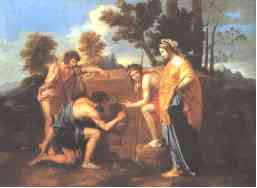 are
working out the lettering on the tomb - "Et in Arcadia Ego" - "I
too am in Arcadia" - Death exists even in Arcadia. Only two things are
certain about our life - we are born, and we must die. Burns, using his vast
background of reading and of personal experience in the Ayrshire countryside,
expresses our concerns, our hopes and fears, in a way no other poet has ever
done. Perhaps we can grasp the spirit of his humanity as we head into the
21st century.
are
working out the lettering on the tomb - "Et in Arcadia Ego" - "I
too am in Arcadia" - Death exists even in Arcadia. Only two things are
certain about our life - we are born, and we must die. Burns, using his vast
background of reading and of personal experience in the Ayrshire countryside,
expresses our concerns, our hopes and fears, in a way no other poet has ever
done. Perhaps we can grasp the spirit of his humanity as we head into the
21st century.
 In
January 1793, he was returning to Thomson a translation of the Greek poet
Pindar, whom he regarded as a "truly original Bard". He enclosed
"A Man's a man for a' that", saying that it was not for publication.
This one song, more than any other, celebrates the worth of each individual,
however poor or humble: "The rank is but the guinea's stamp, The man's
the gowd for a' that." Burns faced up to life as it came, with enjoyment
and despair, and independence and determination. "A man's a man"
contains the revolutionary thoughts of Thomas Paine, it owes something to
the Augustan literary tradition, and it is set to the same rhythms as the
old ribald rhymes of the Scottish countryside. Burns consciously or subconsciously
uses all the influences he had acquired over his (then) 35 years, and adds
his own individual genius. The world he saw around him he put into verse,
and he rarely
In
January 1793, he was returning to Thomson a translation of the Greek poet
Pindar, whom he regarded as a "truly original Bard". He enclosed
"A Man's a man for a' that", saying that it was not for publication.
This one song, more than any other, celebrates the worth of each individual,
however poor or humble: "The rank is but the guinea's stamp, The man's
the gowd for a' that." Burns faced up to life as it came, with enjoyment
and despair, and independence and determination. "A man's a man"
contains the revolutionary thoughts of Thomas Paine, it owes something to
the Augustan literary tradition, and it is set to the same rhythms as the
old ribald rhymes of the Scottish countryside. Burns consciously or subconsciously
uses all the influences he had acquired over his (then) 35 years, and adds
his own individual genius. The world he saw around him he put into verse,
and he rarely 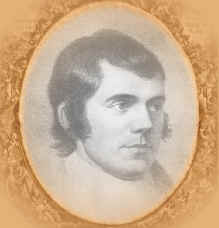 expressed
particular hopes for the future; yet he penned words to inspire us, and those
who follow us: "For a' that, An a' that, It's coming yet for a' that,
That man to man, the world o'er, Shall brithers be for a' that.". His
poems and songs still speak to everyone, in every land.
expressed
particular hopes for the future; yet he penned words to inspire us, and those
who follow us: "For a' that, An a' that, It's coming yet for a' that,
That man to man, the world o'er, Shall brithers be for a' that.". His
poems and songs still speak to everyone, in every land.
Article contributed by
Ian J Dickson,
Ayrshire, Scotland
© 2008 The Robert Burns World Federation